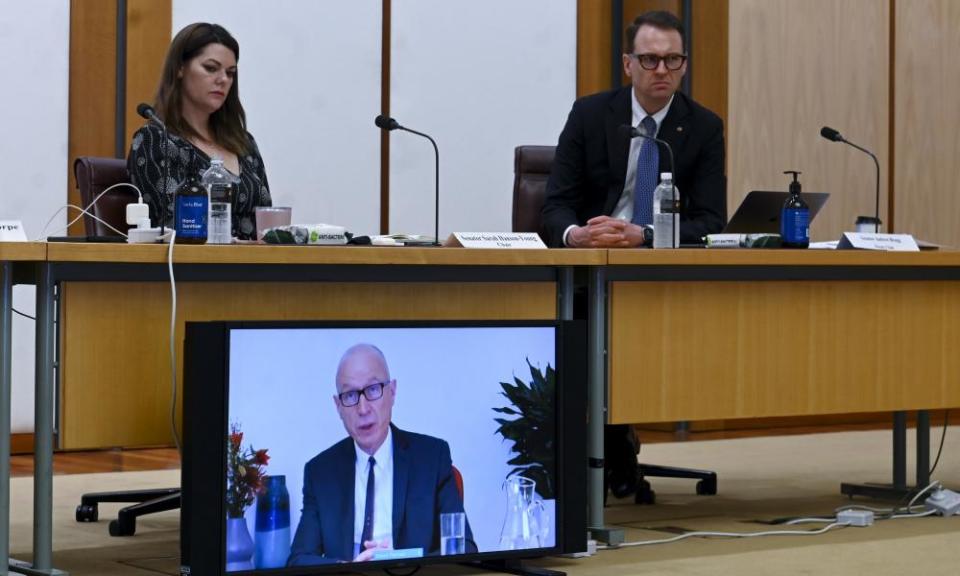‘The real Rupert’: News Corp global chief says idea that Murdoch influences elections is a ‘myth’

The idea that Rupert Murdoch influences Australian elections is a “myth” and far removed from the behaviour of “the real Rupert”, the media mogul’s global chief executive, Robert Thomson, has told a parliamentary inquiry.
Thomson rejected a suggestion by the inquiry chair, Sarah Hanson-Young, that the chairman and CEO of News Corp had a hand in directing his newspaper editors on which party should win.
“Senator, the philosophy is around ideas,” Thomson told the media diversity inquiry via video conference from New York.
“I have to say there is Murdoch the myth ... and the real Rupert.
“And there’s quite a distinction between the two. All societies seem to need their myths – the Greeks, the Japanese. And the idea, the proposition you put is not accurate.”
Hanson-Young had earlier asked Thomson: “Mr Thomson, it’s been put to this committee that Rupert Murdoch likes to pick winners when it comes to Australian elections.
“At News Corp, you said, the company clearly has a philosophy. Does that include being able to determine and back the winner when it comes to elections?”
Thomson revealed that his recent meeting with the Australian prime minister, Scott Morrison, in New York was a post-dinner drinks at which they discussed international affairs, including the upcoming Glasgow climate summit, Afghanistan, France and China.
“We discussed briefly Glasgow in general terms, not our coverage,” Thomson said.
Questioned about whether coverage was dictated by the Murdoch family, Thomson said the co-chairman of News Corp, Lachlan Murdoch, had made it clear he did not tell journalists what to write.
But Thomson did concede the company had a “clear philosophy”.
“As a company clearly we have a philosophy about individual freedom, about the role of the market, about the size of government,” Thomson said. “And in terms of opinion, whether it’s the New York Post or any of our papers, we feel free to express it.”
In 2018, as revealed by the ABC’s Four Corners, Lachlan Murdoch said: “What I do do, running a media organisation is obviously, you know, work closely with the managers of those newsrooms and with the managers of those newspapers and it’s important that they get the ah, the ah, the positioning and the messaging right.”

Thomson said he had extensive experience as an editor and would occasionally offer story tips.
“Secondly, there are discussions between myself, and I can only speak for myself, and the editors, about craft or about issues.
“There is also a large amount of local autonomy.”
Thomson said the first he heard about the Australian’s company’s Mission Zero campaign was when he read it in the Nine newspapers, and it wasn’t entirely accurate.
News Corp’s Australian editors had “collectively” made the decision to run a campaign and he denied suggestions from the committee that it was a “backflip” in terms of editorial policy.
Email: sign up for our daily morning briefing newsletter
App: download the free app and never miss the biggest stories, or get our weekend edition for a curated selection of the week's best stories
Social: follow us on YouTube, Facebook, Instagram, Twitter or TikTok
Podcast: listen to our daily episodes on Apple Podcasts, Spotify or search "Full Story" in your favourite app
Thomson said the company had corporately “pursued a policy consistent with Rupert Murdoch’s statement in 2006 that ‘the planet deserves the benefit of the doubt’”.
“What our local editors have done in Australia is not dictated by me or anyone else,” he said. “So it was very much generated by our editors.”
Thomson said News was an “inherently diverse” company in terms of its views and political positions, pointing to a difference in the position on Brexit taken by the Times and the Sunday Times in the UK.
“The Times and the Wall Street Journal have widely differing policy positions, and, within the same London building, the Times and the Sunday Times often disagree with each other,” he said. “The Times was strongly in favour of ‘Remain’ and the Sunday Times argued for Brexit.
Related: Murdoch empire’s global chief Robert Thomson to front questions at Australian Senate inquiry
“The two papers were ideologically at odds, which is surely evidence of a diversity of views.”
Thomson denied the company’s recent push for net zero was the result of a need to placate advertisers.
The invitation to front the Senate inquiry was accepted by Thomson after Lachlan Murdoch turned down a request to appear last month.
Thomson said that the power of the digital platforms, in particular Facebook, is of great concern as they are acting like publishers but they are not accountable like traditional publishers are.
“There are so many routes by which we can be held accountable,” Thomson said. “We clearly make mistakes and we should be held accountable for mistakes.” Thomson listed a standards editor, readers editor, corrections editor, a media regulator and libel laws as mechanisms for accountability.
“The harsh truth is that our traditional newspapers have become a significantly smaller proportion of News Corp and the words “digital disruption” and “big digital” are both euphemisms. In Australia, print newspaper sales, unfortunately, have suffered a pronounced fall in the past decade. There has been a significant shift in power, influence and profitability from the creators of news content to the distributors of news content.”

 Yahoo Finance
Yahoo Finance 